Table of Contents
Features
Setup
Usage
FAQ covering the following topics:
Multiple stores / warehouses
Languages
Multiple categories
Product / category attributes
Changes made in shop
Non-stock, related and bundle products
Currencies
Shipping
Taxes
Promotions and pricing
Payments
Customer accounts
Invoices / orders
Records exported from Erply to Shopify
Product groups
Regular products
Matrix products
Records imported from Shopify to Erply
Product groups (one-time only)
Regular products (one-time only)
Matrix products (one-time only)
Orders
Order line items
Order shipping items
Customers
Addresses
Payers
Payer addresses
Payments
Advanced Settings
Erply x Shopify connector features
Import products into Erply
Only one-time import during setup.
Product groups
Products and product variations
Product images
Product prices
Export products to Shopify
Quickly update your Shopify product information whenever needed.
Product groups
Products and product variations
Product images
Product prices
Product stock levels
Export any changes to Shopify
Export changes from your Erply account into Shopify.
Added, modified or deleted groups
Added, modified, moved, deleted or archived products
Added or deleted product images
Changes in product pricing
Changes in product stock
Import orders into Erply
Import orders from your Shopify webshop into Erply.
Paid orders
Shipping cost and subtracted discounts
Customers, shipping addresses and billing addresses
Payments
Setting up the Erply Shopify connector
Make sure the connector meets your requirements. Read this document and consult our customer support.
Create a new Shopify account and upgrade it to paid plan.
If you do not already have an Erply account, create an Erply account
Contact Erply customer support to have Shopify enabled for your Erply account. Please note that a charge will be associated with the Shopify connector.
Configure the connector in the Erply back office.
Find the newly enabled Web store module in your Erply back office.
Click Connect Shopify web store and follow the setup instructions.
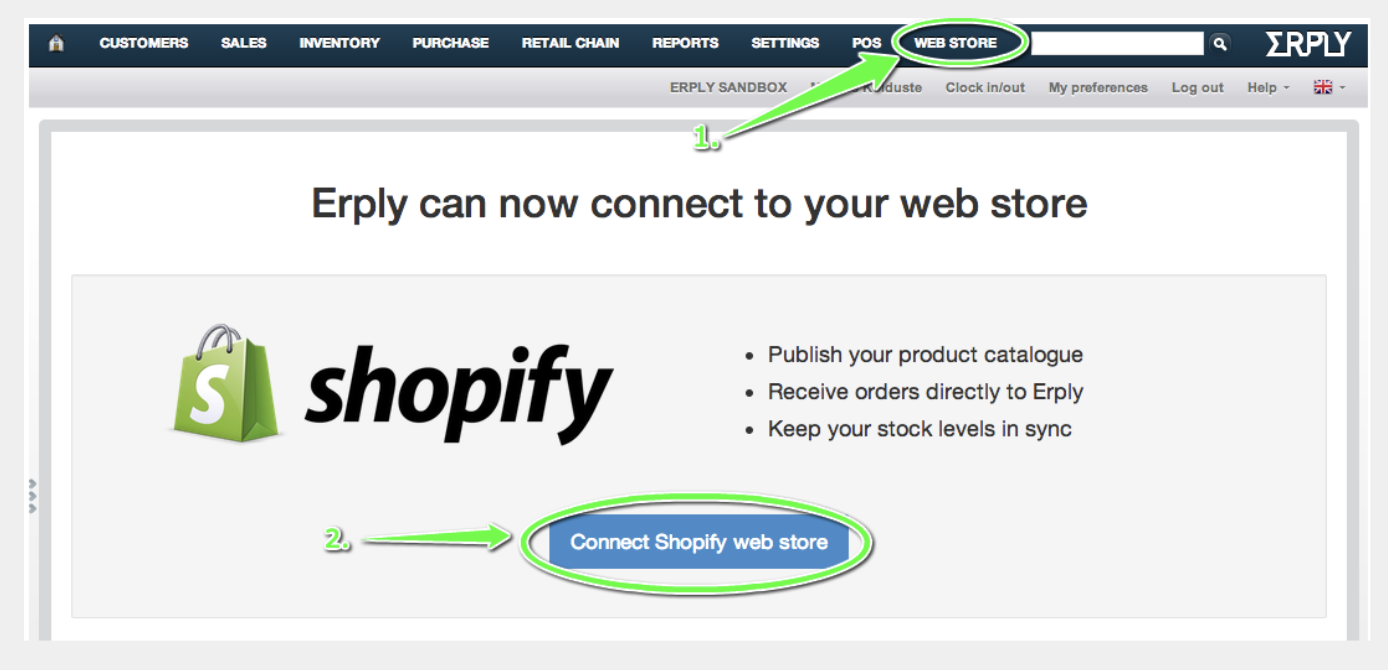
Run a few test synchronizations to ensure your webshop is working as expected:
Sync your products into your Shopify account and ensure they display as expected.
Place a few test orders in Shopify using varying information:
Customer information
Payment information
Tax rates
Discounts
Ensure orders are imported in Erply as expected.
Make any design and text changes to your web store and you are ready to go live.
Usage
Initial product import from Shopify
If your Erply account has the “Enable product import” advanced setting enabled, then you will be able to import your existing products from Shopify account to Erply right after connecting your Erply account with your Shopify account.
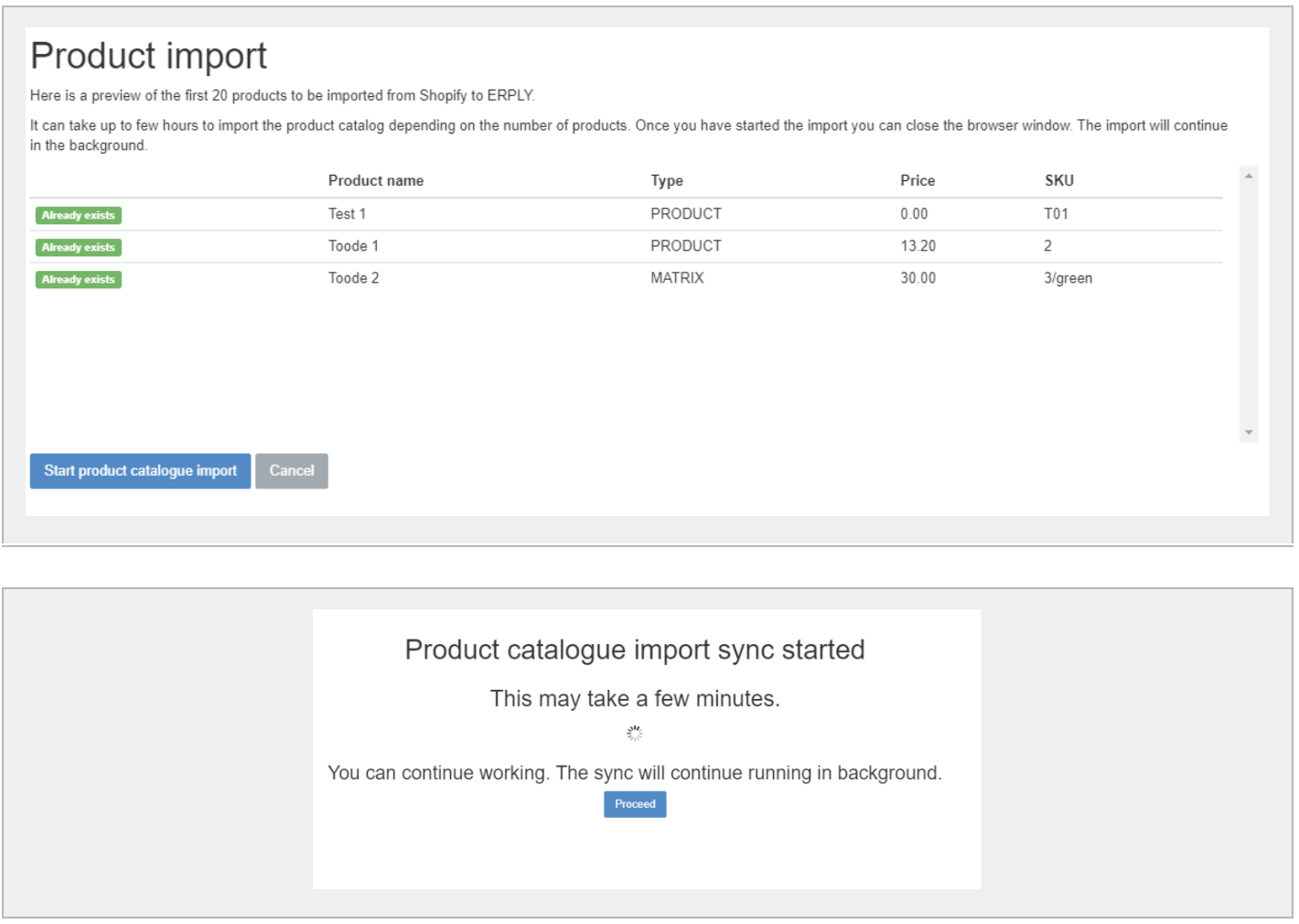
Manual export and import
Once your Erply account and Shopify webstore are connected, you can manually export products to Shopify and import orders to your Erply account.
Product catalog export
Exports all product groups, products, inventory quantities and price list prices to Shopify that have been added or changed after last successful export.
Order import
Imports all sales orders from Shopify that have been added or changed after last successful import.
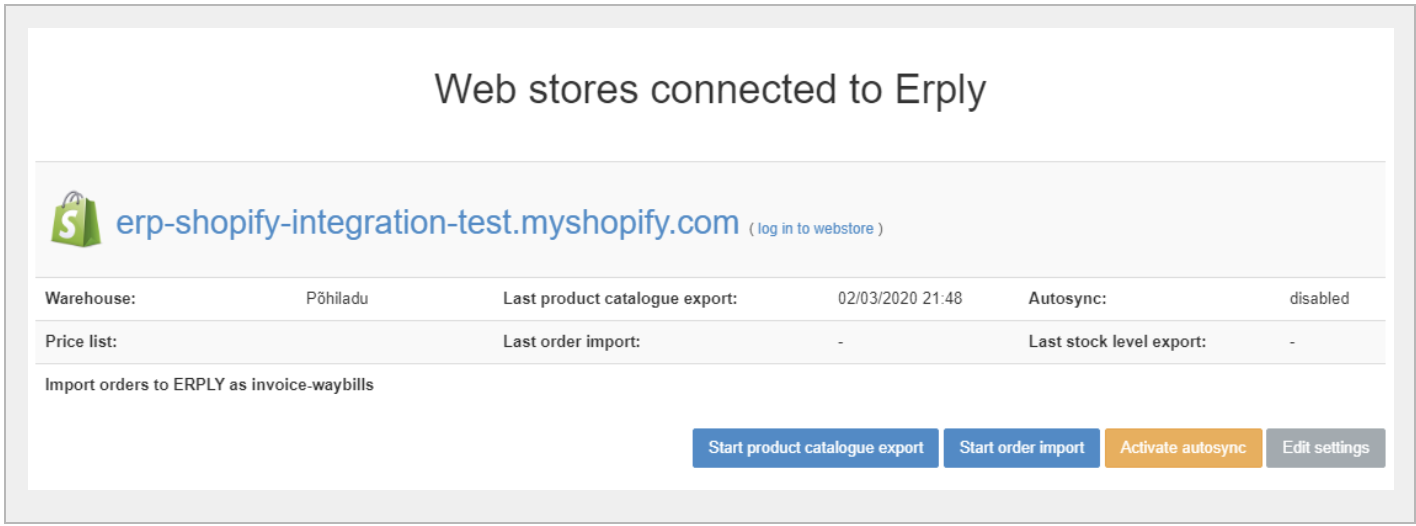
Autosync
If the Shopify autosync feature is enabled, imports and exports will automatically happen at the following intervals:
Export product groups, products, price lists to Shopify: Every 15-30 minutes*
Export inventory quantities to Shopify: Every 1-3 minutes*
Import orders from Shopify: Every 1-3 minutes*
* Please note that the intervals can vary based on the load of the system and the amount of data changed since the last successful import/export.
Settings
Settings are needed to configure data mapping that can not be automatically determined based on Erply or Shopify standard settings.
Making sure the settings match the Shopify and Erply configuration is very important to assure correct quantities and prices are imported/exported.
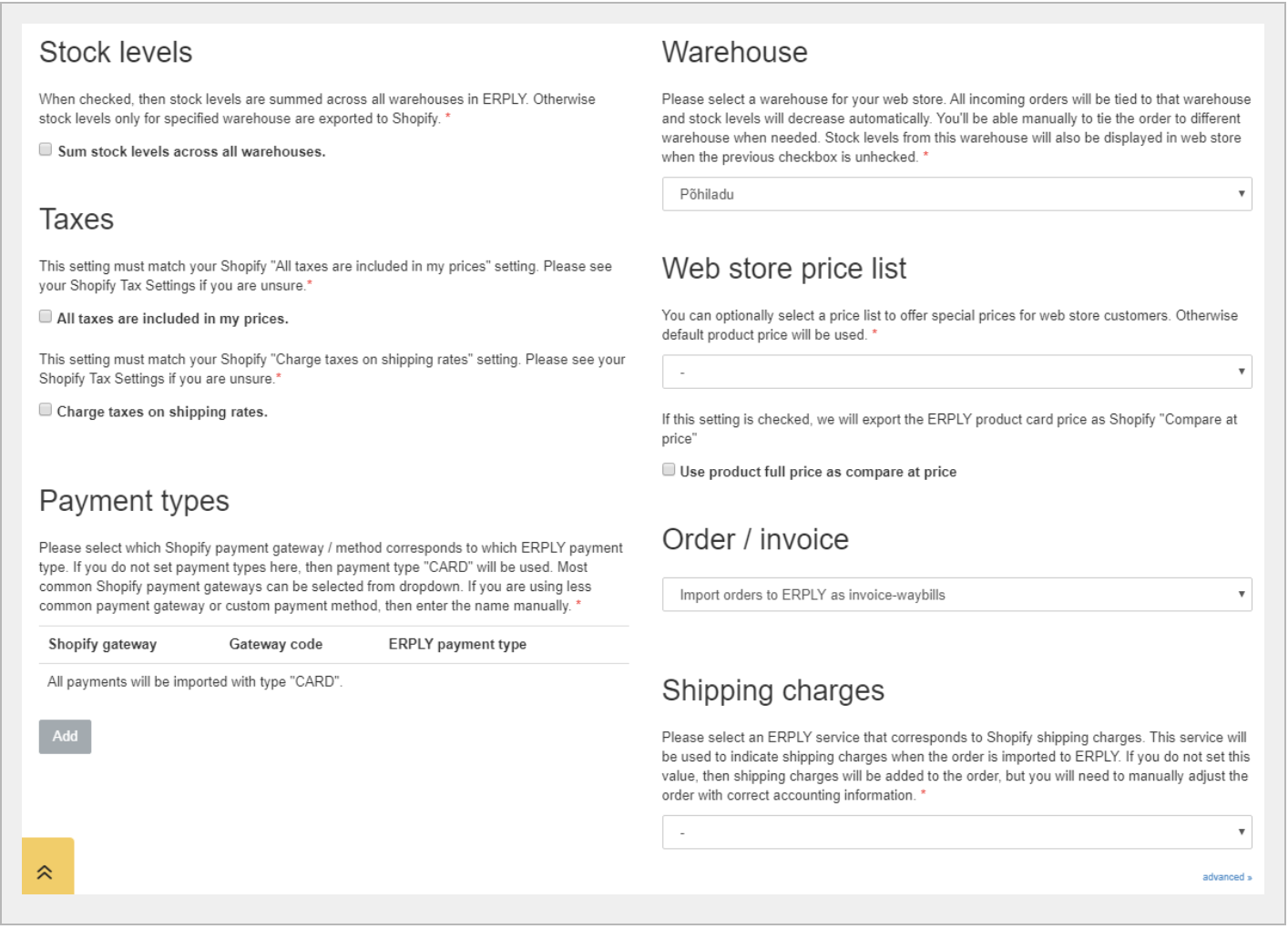
Advanced Settings
Advanced settings should only be used with a qualified Erply consultant. These settings can only be changed when a special Employee Key is used.
Changing the settings can cause data loss on both Erply and Shopify side or significant performance issues for the Shopify Connector.
Language - Use specific Erply account language for export
Enable product import - Checking this setting will allow one-time product import from Shopify to ERPLY.
Enable image export - Unchecking this setting will disable product images from being exported from ERPLY to Shopify. This will enable images to be uploaded and managed on Shopify side. By default all product images are exported to Shopify and images on Shopify side are overwritten.
Enable customer import - Unchecking this setting will disable customer information from being imported from Shopify to ERPLY. All imported orders will be associated with a default customer. By default all customer info is imported to ERPLY.
Enable product updates export - Unchecking this setting will disable product updates from being exported to Shopify. This is useful when initial product information is added through ERPLY, but all following product information management is done on Shopify side. Only newly created products will be exported. Updating or deletion of products will not be attempted. When there is `shopifyId` or `shopifyVariationId` attribute set for the product, then it is assumed that the product exists in Shopify. This also applies to Matrix variations. This means, that variations will not be updated and deleted variations will not be deleted. Please note, that because of this matrix variations should never be re-generated with different dimensions. Otherwise there will be a conflict during export to Shopify that will need to be manually resolved. By default, all product updates are also exported from ERPLY to Shopify.
Enable product groups export - Unchecking this setting will disable product groups from being exported to Shopify. This will cause product export without assigning to any "custom collections" in Shopify and disable export of product groups as "custom collections". Attribute `shopifyCollectId` wont be set for products in Erply. By default, product groups are also exported from ERPLY to Shopify.
Enable assembly product export - Unchecking this setting causes assembly products to not be exported to Shopify.
Enable products to be published when exported - Unchecking this setting cause products exported from ERPLY to Shopify be unpublished. By default all products exported to Shopify will be published.
Enable export special case - Checking this setting will mark the account as special case. Special case accounts have product image export, product stock export and product description export disabled. By default, the accounts are not special case.
Enable tax matching by name - Checking this setting will enable tax matching by all their components and saving new taxes with a set of components. ZIP code wont be used for matching to reduce amount of duplicated data saved in Erply. "City, county and state tax rates" module must be installed on account.
Use stock ajustment sync - If this setting is checked, stock sync to Shopify will adjust amounts instead of replacing and only happen if any confirmed Inventory documents - Write-Off, Transfers, Registration or Purchase Invoices for sync specific warehouse was commited since last stock sync. Also product sync wont update stock information. This setting will reduce stock sync speed but increase accuracy in case of big sales.
Order sync blocks Stock sync - If this setting is checked, Orders sync from Shopify will prevent starting of Stock sync to Shopify at the same time to prevent oversell. Will lead to slower stock sync to Shopify. If "Only allow quantities sync on inventory registrations and write-offs" is enabled - when stock sync is active no any order sync jobs will be executed for same purpose.
Stock reserve value - Stock reserve value. If value is different from zero - stock amount syncronized to Shopify will be decreased by it to reduce posibility of oversell. If stock value is less than decrease value - Shopify amount will be set to 0.
Custom Product Type - Shopify product type attribute name. If this value is not empty for shopify product types sync will use this product attribute value. If product attribute is not set or empty (or this setting is empty) 'Category' name will be used. If product doesnt have category name or it is empty - type will be set to 'Misc'.
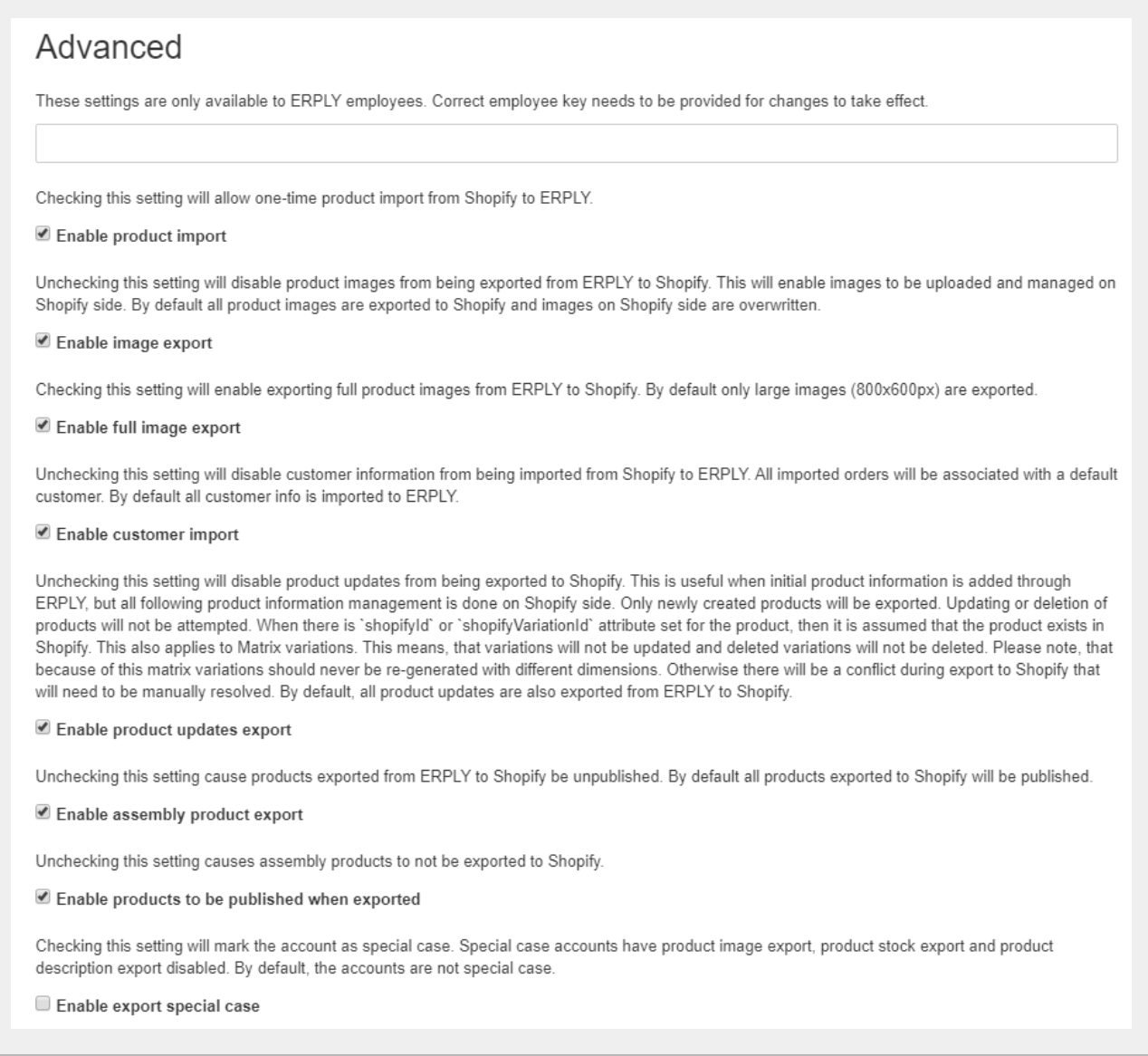
Mark product for export
When the Shopify Connector is enabled on your Erply account, a new “Shopify” tab is added to product form.
This enables manually marking the selected product to be exported to Shopify during next product export.

* Please note that the “Mark product for export” only changes the product’s last update date. This does not guarantee that the product is actually exported. For example if the product is not eligible for export (“Show in webshop” disabled, incorrect price etc) then the export will still skip this product.
Frequently asked questions
Multiple stores/warehouses
Can I configure which warehouse I want to use for my web store?
Yes. You will be prompted to choose a warehouse during setup and can change this in your settings.
Can my Shopify web store show summed stock levels from all warehouses?
Yes. You will be prompted during setup.
Do you support multiple web stores for one backend account?
Yes, multiple web stores are supported.
Languages
Can I set up store in multiple languages?
No, stores can only have one language at this time.
Can I add products to multiple categories/groups?
No, a product can only be assigned one category or group.
Product / category attributes
Do you support product variations / matrix products?
Yes. You can set these up in Erply.
Do you support product attributes (custom options) and attribute sets (for filtering and comparison)?
Not at this time.
Can I add category description, image, pdf etc?
No.
Can I add files to products?
You can only add images like .png and .jpg. .PDF or other files will not synchronize to Shopify.
Can I hide products, groups or variations from web store?
Yes. Use the "Show in webshop" checkbox in Erply. Also products with status “Archived” and “Not for sale” are not synchronized to Shopify.
Do you support quantities with decimals?
No, please only use whole numbers. 1, 2, 3, 4 etc.
Are product dimensions (length, width, height, volume, weight) synced?
Only gross weight is exported to Shopify.
Do you export brand, manufacturer and supplier information to Shopify?
We export a product’s brand to Shopify.
Does Erply require an image at the “child” level for matrix products or at the “Parent” level?
The images must be added to the "Parent" level. Adding different images to each child product is not supported at this time.
Changes made in webshop
What if I change or move a product or product group in my webshop?
Erply will override your changes.
Non-stock, related and bundle products
Do you support non-stock products?
Yes
Do you support related products?
No,
Do you support bundle products?
No.
Currencies
Can I use my local currency?
Yes. Just set this up as base currency in both shop and Erply.
Shipping
How can I add shipping options such as location, speed, weight, cart total, cart item and count?
You’ll need to set up all the methods and prices in your web shop. Erply will just add shipping line as last invoice line.
Do you integrate with UPS, DHL, FedEX so the shipping methods and prices get updated automatically?
These are setup in your Shopify webstore.
Can I add handling and packaging fees?
No
Do you have dropshipping and carrier integrations?
No, these are handled in Shopify.
Do you support multiple shipping addresses?
No.
What product / service is used for shipping when order is imported to Erply?
You can choose the corresponding product during setup. This is optional, but is useful for reporting and accounting purposes.
Taxes
How can I define tax rates?
You’ll need to set up tax rates on both sides: in your shop and in Erply.
When importing we will tie the correct rate to the invoice line. If there is no corresponding tax rate in Erply, then the invoice line will be added with the default tax rate. You can manually add the correct rate later.
Is tax calculated prior or after discount?
We support the latter. You’ll need to check that this is set up both in shop and in Erply.
How to set up region based taxes?
Set up on both sides: in shop and in Erply. If there is no corresponding tax rate in Erply, the invoice line will be added with the default tax rate. You can manually add the correct rate later.
What does the "All taxes are included in my prices" option mean?
This option must match the same option in Shopify. When you choose this option, then prices with VAT are exported to Shopify instead of net prices. When a customer places an order the total price will remain the same even if the final tax rate is different.
What does the "Charge taxes on shipping rates" option mean?
This option must match the same option in Shopify. When you choose this option, then tax is also applied to shipping.
Promotions and pricing
Do you support different prices between my webshop and my POS.
Yes! During setup you can choose a special price list for your webstore.
Can I have special pricing that shows the old price strikethroughed with a new price listed next to it? Example: $60 → $30
Yes! You have to select the “Use product full price as compare at price” setting and select a price list that contains discounted prices. Your Shopify store will show the new discounted prices, as well as the original price that it was marked down from.
Where do I set up promotions. coupons and discount campaigns?
These are not supported by default.
Do you support group pricing, tier pricing?
No.
Do you support customer / customer group based prices?
These are not supported by default.
Payments
Do you support authorization and doing capture later?
This should be done in webstore. Only fully captured orders are imported to Erply.
Where do I set up my payment methods and payment integrations?
In web store.
How are payments imported to Erply?
You can choose which payment gateways correspond to which payment types in Erply during setup. This is optional, but is useful for reporting and accounting purposes. By default all payments are imported as card payments.
Customer accounts
Where do I manage customer accounts and perform actions such as password changes?
Account management is done in your Shopify webstore. Customer accounts are not imported to Erply -- only customers and addresses are added when importing orders.
To avoid duplicates, Erply checks if matching customers and addresses are found during the import process.
Invoices and orders
Can I choose if purchases coming in from Shopify are imported to Erply as invoice or as orders?
Yes. You can choose this during setup.
Invoice-waybills (depletes inventory quantities)
Stock is moved and the transaction is completed as soon as the document comes into Erply.
Orders (reserves goods by putting them in layby)
A few confirmation steps required to complete the order.
Used for buy online, pickup in-store orders.
How is shipping cost displayed on invoices in Erply?
Shipping cost is added as extra line item.
Are Shopify discounts displayed on invoices within Erply?
Yes! Shopify discounts are displayed as an extra invoice line item. In Erply, discounts are subtracted from each line.
Does importing orders into Erply create duplicate customers?
No. If a match is found, then the existing customer will be used for billing, shipping or both.
Records exported from Erply to Shopify
Product groups
Product groups in Erply can have subgroups. Collections in Shopify have flat structure. So during a product sync, only top-level groups are imported to Shopify. Products under subgroups are treated as children of the top level group.
We will check if a group is already exported to Shopify by looking at the attribute shopifyId.
New groups will be added to Shopify and existing groups will be updated.
Deleted groups will NOT be deleted from Shopify.
Groups with “Show in webshop” unchecked will not be exported to Shopify. Unchecking the field will NOT cause the collection to be removed from Shopify.
Groups where the “Name” field is left blank will not exported to Shopify. Removing group names will NOT cause products to be removed from Shopify.
| Shopify field | Erply field |
| Collection: name | Product group: name |
Regular products
We will check if product is already exported to Shopify by looking at attributes shopifyId and shopifyVariationId. New products will be added to Shopify, existing products will be updated and deleted products will be removed from Shopify ****.
Products with “Show in webshop” unchecked will not be added to Shopify. Unchecking the field will cause product to be removed from Shopify.
Archived or not for sale products will not be added to Shopify. Archiving or marking product not for sale will cause product to be removed from Shopify.
Products without “Name” will not be exported to Shopify. Removing product name will cause product to be removed from Shopify.
If product group was not exported to Shopify then none of the products in this group are exported to Shopify. Changing the product group so that it is removed from Shopify will cause the product in that group to also be removed from Shopify.
Products with negative price are not exported to Shopify. Changing product price to negative will cause product to be removed from Shopify.
Giftcards are not exported to Shopify. Changing existing product to a gift card will NOT cause product to be removed from Shopify.
| Shopify field | Erply field |
| Product: name | Product: name |
| Product: vendor | Product: brand |
| Product: type | Product: category |
| Product: description | Product: web fields: long description * |
| Product: images: src | Product: pictures: large URL */**/*** |
| Product: images: metafields: tags: alt | Product: pictures: name */** |
| Product variant: price |
Product: net sales price / sales price with VAT Price list rule: net sales price / sales price with VAT |
| Product variant: compare at price | Product: net sales price / sales price with VAT ***** |
| Product variant: sku | Product: code |
| Product variant: charge taxes | Product: tax free in all locations |
| Product variant: requires shipping | Product: non-stock product or service * |
| Product variant: stock quantity | Product variant: stock levels: available * |
| Product variant: weight | Product: gross weight * |
* Not exported if “Enable export special case” parameter is set
** Not exported if “Enable image export” parameter is disabled
*** Field “Product: pictures: full URL” is used when “Enable full image export” parameter is set
**** Product updates and deletions will not be exported if “Enable product updates export” parameter is disabled.
***** Only when “Use product full price as compare at price” setting is enabled.
Matrix products
Product dimensions can be modified, added or deleted. All changes will be synced to Shopify.
We will check if product is already exported to Shopify by looking at matrix parent attribute shopifyId and matrix variation attribute shopifyVariationId. New products will be added to Shopify, existing products will be updated and deleted products will be removed from Shopify ****.
Matrix products without dimensions will not be exported to Shopify. Deleting all dimensions will cause product to be removed from Shopify.
Matrix products with empty dimension name will not be exported to Shopify. Adding a dimension with empty name will cause product to be removed from Shopify.
Matrix products with duplicate dimension names will not be exported to Shopify. Adding a dimension with duplicated name will cause product to be removed from Shopify.
Matrix products without variations will not be exported to Shopify. Once variations are added, the product will appear in Shopify. Deleting all variations will cause product to be removed from Shopify.
Matrix products or variations with “Show in webshop” unchecked will not be added to Shopify. Unchecking the field will cause product to be removed from Shopify.
Archived or not for sale matrix products or variations will not be added to Shopify. Archiving or marking product not for sale will cause product to be removed from Shopify.
Matrix products without “Name” will not be exported to Shopify. Removing product name will cause product to be removed from Shopify.
If product group was not exported to Shopify then none of the matrix products in this group are exported to Shopify.Changing the product group so that it is removed from Shopify will cause the product in that group to also be removed from Shopify.
Matrix products or variations with negative price are not exported to Shopify. Changing product price to negative will cause product/variation to be removed from Shopify.
Gift Cards are not exported to Shopify. Changing existing product to a gift card will NOT cause product to be removed from Shopify.
| Shopify field | Erply field |
| Product: name | Product: name |
| Product: vendor | Product: brand |
| Product: type | Product: category |
| Product: description | Product: web fields: long description * |
| Product: images | Product: pictures: large URL */**/*** |
| Product: images: metafields: tags: alt | Product: pictures: name */** |
| Product options | Product dimensions |
| Product variant: name | Product variant: name ENG |
| Product variant: price |
Product variant: net sales price / sales price with VAT Price list rule: net sales price / sales price with VAT |
| Product variant: compare at price | Product: net sales price / sales price with VAT ***** |
| Product variant: sku | Product variant: code |
| Product variant: charge taxes | Product variant: tax free in all locations |
| Product variant: requires shipping | Product variant: non-stock product or service * |
| Product variant: stock quantity | Product variant: stock levels: available * |
| Product variant: weight | Product: gross weight * |
* Not exported if “Enable export special case” parameter is set
** Not exported if “Enable image export” parameter is disabled
*** Field “Product: pictures: full URL” is used when “Enable full image export” parameter is set
**** Product updates and deletions will not be exported if “Enable product updates export” parameter is disabled.
***** Only when “Use product full price as compare at price” setting is enabled.
Records imported from Shopify to Erply
Product groups (one-time only)
Existing groups are matched based on name or by shopifyCollectId attributes.
| Shopify field | Erply field |
| Collection: name | Product group: name |
Regular products (one-time only)
Existing products are matched based on SKU or by shopifyId and shopifyVariationId attributes.
Inventory quantities will not be imported to Erply
Gift cards are not imported to Erply.
| Shopify field | Erply field |
| Product: name | Product: name |
| Product: vendor | Product: brand (new brand is created if not found) |
| Product: type | Product: category (new category is created if not found) |
| Product: description | Product: web fields: long description |
| Product: images | Product: pictures (existing pictures will be removed) |
| Product variant: price | Product: net sales price / sales price with VAT |
| Product variant: sku | Product: code |
| Product variant: charge taxes | Product: tax free in all locations |
| Product variant: requires shipping | Product: non-stock product or service |
| Product variant: weight | Product: gross weight |
Matrix products (one-time only)
Existing products and variants are matched based on SKU or by shopifyId and shopifyVariationId attributes.
Inventory quantities will not be imported to Erply
Giftcards will not imported to Erply.
| Shopify field | Erply field |
| Product: name | Product: name |
| Product: vendor | Product: brand (new brand is created if not found) |
| Product: type | Product: category (new category is created if not found) |
| Product: description | Product: web fields: long description |
| Product: images | Product: pictures (existing pictures will be removed) |
| Product options | Product dimensions |
| Product variant: name | Product variant: name ENG |
| Product variant: price | Product variant: net sales price / sales price with VAT |
| Product variant: sku | Product variant: code |
| Product variant: charge taxes | Product variant: tax free in all locations |
| Product variant: requires shipping | Product variant: non-stock product or service |
| Product variant: weight | Product: gross weight |
Orders
Only paid orders are imported to Erply.
| Erply field | Shopify field | Value |
| type | Can be chosen during setup | |
| number | Generated by Erply | |
| currency | Order: currency | |
| date | Order: date | |
| time | Order: date | |
| customer * | Order: shipping address | |
| address * | Order: shipping address | |
| payer * | Order: billing address | |
| payer address * | Order: billing address | |
| notes | Order: note | |
| warehouse | Can be chosen during setup |
* Not imported if “Enable customer import” parameter is disabled
Order line items
| Erply field | Shopify field |
| line item name | Order: line item product name |
| line item VAT | Order: tax amount |
| line item amount | Order: line item quantity |
| line item price | Order: line item price |
| line item discount | Order: discount divided to all lines |
Order shipping items
| Erply field | Shopify field | Value |
| line item name | Order: shipping line title | |
| line item VAT | Order: shipping line tax amount | |
| line item amount | 1 | |
| line item price | Order: shipping line price |
Customers
| Erply field | Shopify field |
| First name * | Order: shipping address: first name |
| Last name * | Order: shipping address: last name |
| Email * | Order: email |
| Phone * | Order: shipping address: phone number |
* Not imported if “Enable customer import” parameter is disabled
Addresses
| Erply field | Shopify field | Value |
| Type * | "mailing address" | |
| Address line 1 * |
Order: shipping address: address line 1 + Order: shipping address: address line 2 |
|
| Zip * | Order: shipping address: postal / zip code | |
| City * | Order: shipping address: city | |
| State * | Order: shipping address: region | |
| Country * | Order: shipping address: country |
* Not imported if “Enable customer import” parameter is disabled
Payers
| Erply field | Shopify field |
| First name * | Order: billing address: first name |
| Last name * | Order: billing address: last name |
| Email * | Order: email |
| Phone * | Order: billing address: phone number |
* Not imported if “Enable customer import” parameter is disabled
Payer addresses
| Erply field | Shopify field | Value |
| Type * | "mailing address" | |
| Address line 1 * |
Order: billing address: address line 1 + Order: billing address: address line 2 |
|
| Zip * | Order: billing address: postal / zip code | |
| City * | Order: billing address: city | |
| State * | Order: billing address: region | |
| Country * | Order: billing address: country |
* Not imported if “Enable customer import” parameter is disabled
Payments
| Erply field | Shopify field | Value |
| Payment: customer * | Same as payer of order | |
| Payment: type | Order: payment method | Mappings can be chosen during setup |
| Payment: date | Order: date | |
| Payment: amount | Order: total price | |
| Payment: currency | Order: currency | |
| Payment: payer |
Order: checkout ID + Order: gateway |
|
| Payment: last 4 digits of card number | Payment: credit card number | Format **** *** *** XXXX |
| Payment: card type | Payment: credit card company | |
| Payment: cardholder's name * | Order: customer first name + Order: customer last name |
* Not imported if “Enable customer import” parameter is disabled